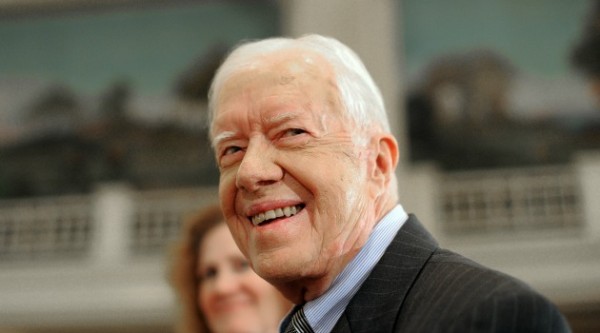Jimmy Carter, "Progressive" Evangelicals, and the Religious Right
by Chelsen Vicari
http://juicyecumenism.com/2013/10/27/jimmy-carter-progressive-evangelicals-and-the-religious-right/
October 27, 2013
 Pepperdine University's Washington, DC program honored the late U.S. Sen. Mark Hatfield (R-Oregon) in a Senate conference room on October 22 with speaker Randall Balmer, historian of evangelicals, Episcopal priest and Chairman of Dartmouth College's Religion Department. Balmer's lecture examined the history of evangelicalism's - both liberal and conservative - effect on former President Jimmy Carter's political success and failures.
Pepperdine University's Washington, DC program honored the late U.S. Sen. Mark Hatfield (R-Oregon) in a Senate conference room on October 22 with speaker Randall Balmer, historian of evangelicals, Episcopal priest and Chairman of Dartmouth College's Religion Department. Balmer's lecture examined the history of evangelicalism's - both liberal and conservative - effect on former President Jimmy Carter's political success and failures.
"How it is that the very [evangelical] people who helped catapult [Carter] to the White House in 1976 turned so drastically...rapidly against him four years later?" questioned Balmer, who is currently working on a book addressing Carter's faith and the presidency.
Balmer explained that the impetus behind his book really began while he was in college shortly after Carter arrived on the national scene. "Here was someone who claimed to be a born-again Christian and isn't ashamed to say so, which at that time was a rather new thing, at least for us evangelicals in the Midwest."
Once, when the former President was asked about faith's compatibility with politics, Balmer relayed that Carter responded, "I think every one of us in our own lives has inherit conflicts built in as we equate our Christian beliefs with our worldly responsibilities."
Similarly, "In positioning himself for the presidential campaign, Carter frequently invoked the vocabulary of evangelicals. As a born-again Christian, he told reporters for the National Courier, 'I don't want anything that is not God's will for my life.'"
Balmer continued: "Carter began his campaign for the presidency during the mid-70s under paradox and duplicities. Despite the fact that Carter had courted segregationists for his second and successful gubernatorial campaign, the media seized on Carter's inauguration as a transitional moment for the South."
During the same time that Carter was on the political rise, a revived emergence of "progressive" evangelicalism began to surface, due in part, to the "popular revulsion against Richard Nixon," said Dr. Balmer.
Progressive evangelicals gathered over Thanksgiving weekend at the Chicago YMCA in 1973 to draft the Declaration of Evangelical Social Concern. Among the attendees was Jim Wallis, Ron Sider, Robert Weber, William and Ruth Bentley, John Howard Yoder and, somewhat reluctantly, the founding editor of Christianity Today, Carl F.H. Henry. The group gathered, Balmer said, "to emphasize social sins as vigorously as personal sins" to denounce the nation's reliance on the military, the materialism of culture, racism, male domination and the lack of concern for the poor.
Carter's presidential platform, according to Balmer, "echoed the themes" of progressive evangelicals' concerns outlined in the Declaration of Evangelical Social Concern because of "his concern about poverty and human rights, his support for public education and his quest for a less imperial foreign policy."
Balmer said, "Fundamentalists jumped on the Carter bandwagon to bask in the movement's sudden popularity."
Evangelicalism, after being ignored on the American religious scene, was finally being acknowledged in the public square. Balmer explained that amid the popularity of Jimmy Carter, America witnessed the popularity of books like "Born Again" by Charles Colson and evangelicals earned the cover title of 1976 Newsweek's edition, "The Year of the Evangelical."
A turning point for conservative evangelicals came after Carter's interview with Playboy Magazine, explained Balmer. During the interview, Carter stated, "We're taught not to judge other people." He continued, "I have committed adultery in my heart many times...Don't consider yourself better than someone else because one guy screws a whole bunch of women while the other guy is loyal to his wife. The guy who is loyal to his wife ought not to be condescending."
For conservative evangelicals, Carter's use of verbiage was off-putting, to say the least. And Balmer explained that soon "hard right religious operatives" began working to undermine Carter's evangelical base as Gerald Ford rose as a strong contender in the '76 presidential election. Balmer noted that Carter finally acknowledged the Playboy interview delivered a "devastating blow to our campaign."
Touching on Billy Graham's influence, Balmer pointed out, "I can detail many instances of Graham's,...I'll say it, duplicity. That's another lecture. Perhaps a post-mortem lecture."
Continuing on, Balmer explained that Paul Weyrich, a conservative political strategist, needed an issue that would "galvanize evangelical leaders and the grassroots movement." The issue, claims Balmer, was tax exemption for religious schools, starting with a denial to Bob Jones University. Not abortion, not the Equal Rights Amendment, and not prayer in schools. "Weyrich finally had the issue that would motivate evangelical leaders," exclaimed Balmer.
Soon after, Francis Shaeffer was brought in as the "intellectual god-father of the religious right - brought up moral relativism" to declare that, "We now live in a secular society," Balmer recalled. Now, abortion was cited as a troubling shift away from Christianity and towards secularization.
Carter's refusal to seek a bill against abortion was deemed an "unforgivable sin by the religious right." Yet, many of the conservative evangelicals who turned so drastically against Carter passionately supported Ronald Reagan who, according to Balmer, "had signed one of the most pro-abortion" pieces of legislation in the country when California's governor.
In conclusion, Dr. Balmer stated that a new coalition had been successfully crafted by Weyrich and others, which was "fashioned into an estimable religious machine, [and] which they used to deny one of their own." Dr. Balmer claimed that, "The very constituency that helped the born-again son of the South win the White House" turned on him in the name of tax exemption.













